ATX Television Festival 2018
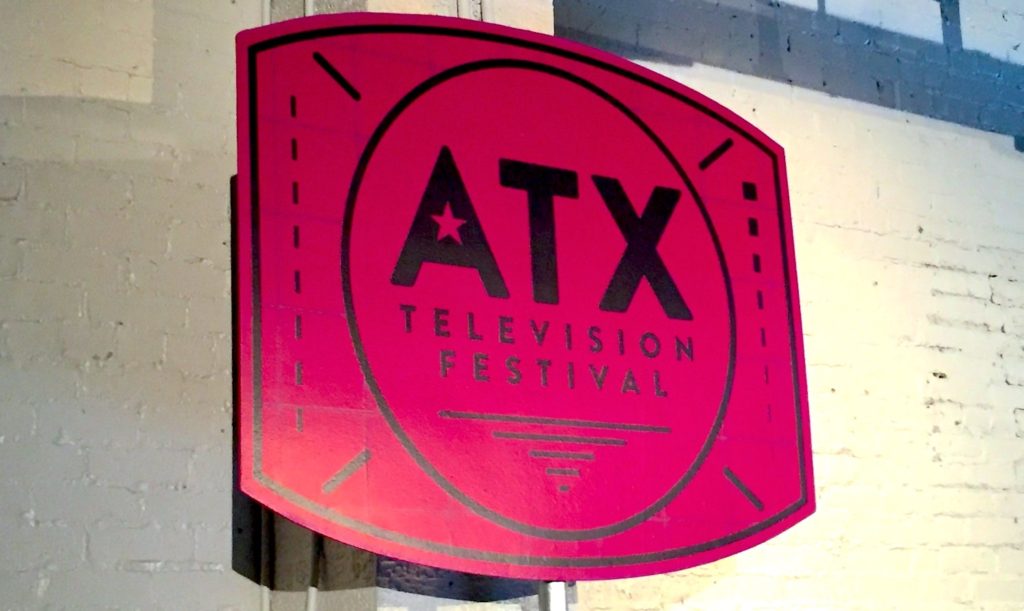
Each year, Austin hosts a number of media festivals, conferences, and conventions like SXSW, Austin Film Festival, Fantastic Fest, the RTX Gaming Convention, and the ATX Television Festival. One of the perks of studying media in Austin is that we’re often gifted with discounts to such events. This year, many UT Austin RTF graduate students were able to attend the 7th annual event due to the generous support of ATX.
In September 2018, we will be hosting our own Austin media event, Flow 2018. This year’s theme is “Precarity, Preservation, Praxis” and, in keeping with that theme, we have decided to write up our coverage of ATX 2018 for those who were unable to attend. We’ve sourced and compiled notes and reflections from the grad students who attended the festival. While our coverage is not exhaustive—ATX uploads recordings of the panels on YouTube and releases them via their new podcast, The TV Campfire—it can serve as a primer for the varied panels, screenings, and events that some of the RTF graduate students in attendance found particularly compelling.
Overview
Based on this year’s programming, ATX seems well-aware of the excitement surrounding specific showrunners (Ava DuVernay, David Simon, etc.) and specific outlets (HBO, Hulu, etc.). For example, audiences cheered every time the HBO logo appeared on screen. Even so, that excitement seems to be specifically tied to notions of prestige content. Aside from a few notable exceptions—the congratulatory Felicity, TGI!Hulu, and Freeform panels, for example—little attention was paid to linear networks and their content. It seems, at least at ATX, that “TV fans” have been redefined in terms of licensing agreements, original content, and streaming platforms. As a repeat attendee, it appears that ATX’s “TV fans” are also being redefined demographically: the majority of the attendees were young women.
As a festival that balances screenings with behind-the-scenes industry panels, the audience, industry, and critical discourses on display at ATX are typically quality-focused, auteur-driven, and brand-defined. However, in the wake of the #MeToo movement, the organizers and their industry panelists are clearly trying to attend to identity politics and representational issues. This year’s festival included several panels that directly addressed the complex, intersectional power dynamics that play out in the negotiation between creative vision, industrial imperative, and audience response. While there were a few stumbles—the Why Does TV Matter? panel featured four white panelists discussing diversity, for example—the needle does seem to be moving in a favorable direction, especially compared to similar conventions and festivals. That being said, from our responses, it is clear that a renewed focus on politics (identity, industry, and governmental) exposes the problematic nature of quality, auteur, and brand-focused discourses.
As repeat ATX attendees noted,
This year’s ATX festival was as convivial and friendly as ever, with many attempts by panel participants (and festival organizers) to address and respond to the issues of race, gender, sexuality, and identity which have become pointed sources of cultural debate and pressure for the entertainment industry in the wake of Black Lives Matter, President Trump’s Election, and the Harvey Weinstein revelations and MeToo Movement. Characteristically, many of the industry-focused panels were relatively self-protecting and nonspecific in their responses and several replicated what are the by now common refrains about focusing on “quality,” “artists'” and creatives’ “visions,” and on “telling good stories,” with several references to the “new stories” and different “voices” which are now being told and heard with more frequency and visibility. Indeed, many of the panels I attended spoke to the fact that things were changing and improving and earnestly testified that progress has been made. This referred not only in terms of the rapidly changing media production and consumption landscape (streaming and youth audiences remained the primary destabilizing force), but also to American and media cultures which have become increasingly open to and inclusive of different kinds of representations, the challenging of established power dynamics and binaries, and the visibility of difference/different kinds of people.
— Jackie Pinkowitz, PhD in Media Studies
The ATX television festival markets itself as “TV camp for adults” and it has grown steadily over the last seven years, or “seasons” as they cheekily label each festival. Increasingly the event appears geared explicitly toward cultivating the notion of “fans of tv” in general. What does it mean to be a fan of television as a broader practice, rather than following specific series, episodes, stars or producers? How much of this phenomenon is an artifact of the current moment of “Peak TV” and an explosion of platforms competing for content? Moreover, the TV discussed privileges the narrative, the dramatic, and the “serious.” Even within this narrowed lane of “legitimate TV,” viewers and critics explicitly acknowledge the impossibility of keeping up. One of the unique qualities of ATX is its cultivation of a space where industry, press, and audience collide. Because of this, many panel discussions appear to display a negotiation between the sensibilities of all three.
— Kyle Wrather, PhD in Media Studies
Below, you will find impressions about an array of panels and screenings from RTF graduate students. These impressions, while not comprehensive, are designed to convey a sense of the themes and issues that animated each panel. Our hope is that you can use our impressions to help locate and contextualize interviews that may prove useful for research and teaching purposes. If you would like more information on specific panels or events, click on their titles to see brief synopses, panelists, and sponsors. For the full recordings, visit ATX’s YouTube account.
Panels
20 Years: Blown Deadline
Sparsely attended, which made sense given the amount of jokes made at the expense of Blown Deadline’s diminutive audience. Was more of a celebration of the work of the producers and their team than anything too in depth, but I appreciated the head of HBO miniseries confirming why they continue to allow David Simon to make TV shows: because they’re good and important despite their tiny audience.
— Nathan Rossi, PhD in Media Studies
The panel celebrating 20 years of David Simon and Nina Noble’s Blown Deadline Productions creating TV greats like The Wire, Treme, and The Deuce with/for HBO was somewhat underwhelming. It admirably brought people representing many different facets of TV production—including a casting director, two actors, and a representative from HBO—but one has the feeling that the panel would have been more interesting and informative if run as a more intimate conversation with just Simon himself.
— Jackie Pinkowitz, PhD in Media Studies
After witnessing a panel on inclusivity with four white women, I actually found David Simon to be extremely articulate, thoughtful, and forthcoming about his privilege as a director/writer/showrunner over the years. We even got to hear an interesting story where an HBO exec was convinced a NYT‘s journalist was going to take down The Corner while they were shooting over a series on “race in the workplace.” Great conversation!
— Kate Shannon, MA in Media Studies
American Vandal: Orchestrating The Perfect (Un)True Crime
The panel was well attended, and people in the audience were clearly big fans of the Netflix mockumentary. The most interesting part of the panel was listening to the creators, head writer, and producer talk about their love and respect for the true crime genre, and their earnest efforts to emulate, rather than parody true crime tropes. They felt that the more serious they played it in the writing, acting, directing, and editing of the series, the funnier it would be in the end. No hints were offered as to where season 2 is headed.
— Kate Cronin, PhD in Media Studies
Breaking Down the Binary
For me, the highlight of the festival was “Breaking down the Binary,” which was moderated by stand-up comedian Cameron Esposito, who was incredibly charming and witty in her frank discussion with fellow panelists (including wife and co-star Rhea Butcher). Her talents as a stand-up were on full display not only in the way she helped keep a discussion about identity and gender, racial, and other identities, politics, and representations simultaneously insightful and grounded, but also in how she handled a disruptive episode with an audience member, who was dressed as as robot and repeatedly interrupted the panelists, made derogatory and disrespectful comments to them, and had to be escorted out by security. Though she admirably kept her cool and helped make sure audiences members did the same, she did decisively dismiss his actions and comments as unacceptable before scolding the robot for wasting everyone’s time.
— Jackie Pinkowitz, PhD in Media Studies
Crashing and High Maintenance
The folks from High Maintenance were a little more serious and Ben Sinclair even commented after one of his jokes gained only a few laughs that we had all “yucked it up for Pete Holmes!” It’s a shame that the audience was primarily there for Crashing, because High Maintenance is genuinely doing something interesting on television. The divorce that takes place on High Maintenance doesn’t really take place on the show itself but is revealed to us in small side details over the course of several episodes. What we find is not a “man-child” learning that his wife cheating is in fact, not a tragedy, but instead, a person interacting and feeling happy for a former partner who has recently come out.
— Kate Shannon, MA in Media Studies
The Crashing panel was a discussion between Drunk History presenter Derek Waters and Crashing‘s star, Pete Holmes. Holmes discussed his short-lived series on TBS and his failed pitch to Comedy Central, where his sketch comedy idea was never uttered out loud after executives lamented the over-saturation of sketch programming.
With the High Maintenance panel, the showrunners and writers present discussed the desire for “naturalistic acting, plausible experiences, and brevity” in their Vimeo series before it moved to HBO. Interestingly, they didn’t seem to think any shifts occurred in that transition to premium cable, with the budget remaining relatively low and their representation actually becoming more diverse.
— Eric Forthun, PhD in Media Studies

Critics Throwdown
The critics round-up was, refreshingly, an all-female panel of television critics. They discussed championing little known television shows and whether to reboot or not to reboot (Heaven help anyone who tries to reboot The Leftovers, because Mo Ryan is coming for you). They unequivocally rejected the idea of guilty pleasures for the gendered, raced, and classed connotations often associated with “guilty pleasure television,” and they expressed concern that cries about peak TV might actually close doors to marginalized voices who are only just now making it into “the room where it happens.”
— Kate Cronin, PhD in Media Studies
In “Critics Throwdown,” panelists shared their opinions and perceptions about TV viewing and production practices—for example, the panelists discussed the intricacies of how and when to engage with shows and whether it was OK to start from the beginning of a series or jump in “mid-stream.” While there was no consensus about this, the public discussion highlights a discursive negotiation of what contemporary TV watching is. As the technological and practical structure of TV is further and further removed from strict broadcast schedules and programming blocks, viewers and critics must negotiate patterns of consumption that remain legible not only to producers, distributors and advertisers, but to each other. These practices must take a more central role because platforms and content distributors have begun to take precedence in discussions. Platforms like Netflix, Hulu, Amazon (with their seemingly endless acquisitions and competition for “content”) have become a new shorthand for the kinds of televisual content being watched.
— Kyle Wrather, PhD in Media Studies
Though I don’t study critics, this panel was remarkable—both because it broke the mold in terms of white male panelists and because said panelists were refreshingly candid and self-aware. When asked about the difficulties of operating in the “Peak TV” era, all three panelists immediately foregrounded the privilege and pleasure inherent in their careers as television critics. Overall, they adopted a “cream rises to the top” argument in terms of navigating a flooded television landscape. In such a system, Sarah Rodman (Entertainment Weekly) noted that critics more-or-less act as human recommendation algorithms. As a labor scholar, it was heartening to hear them denounce the trend of writing for free as a way to enter the field. Rodman explained that doing so will probably not help you and will definitely not help the people who come up after you. For those interested in becoming TV critics in the future, they painted a fairly grim picture: despite the increase in shows to cover, most opportunities for new critics are happenstance and the economics of TV criticism are bleak.
— Lesley Willard, PhD in Media Studies
Emerging Studios
Executives from a number of emerging studios discussed the issues they face as the television landscape continues to evolve rapidly in the age of Peak TV. Perhaps the most valuable insight focused on the relationship these studios have with their content creators and the new types of distribution deals they negotiate with networks and streaming platforms all around the world. The day before the panel, news broke that powerhouse TV producer Greg Berlanti had signed a $400 million contract extension with Warner Bros. Television, which instigated conversation about the difference between traditional and emerging studios in their relationships with their content creators. The executives noted that their emerging studios advocate for their content creators and help build their business more than traditional studios do. The end of the panel was perhaps the weakest moment, with panelists giving somewhat patronizing advice on how to develop a project and how to enter the industry. Overall, the panel had some bits of good information, but could have benefitted from a better set of questions to ask the panelists.
— Rusty Hatchell, PhD in Media Studies
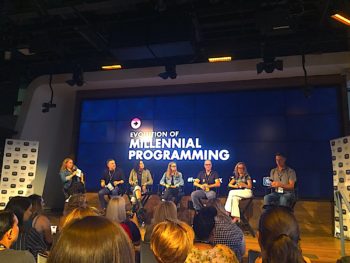
Freeform’s Evolution of Millennial Programming
Of all the panels I’ve attended at ATX, the Freeform panel was the most polished I’ve ever seen. While they benefited from the singular focus of the panel, Freeform came to play: they brought the key creative executives and EPs from their network while maintaining gender parity. When questioned about why their young and/or POC creatives were not in tow, panelists noted that they were all busy working before rattling off impressive statistics about the network’s employment and promotion of young, female, and/or POC creatives. Karey Burke—FF’s EVP of Programming & Development—disclosed their internal brand filter: “cool shit for baller women.” They were candid about their approach towards and celebration of young, female, diverse viewers—it is a branding and product differentiation strategy built on “relevancy, inclusivity, authenticity.” The panelists successfully negotiated the fine line between celebrating and pandering, acknowledging that every move they make is carefully calculated to court their core millennial (female) demographic. It was refreshing, actually, to see a network side-step auteur and quality discourses in favor of a capitalist discourse that at least acknowledges audience agency (Nielsen powers activate!). Throughout, the creatives and execs of Freeform claimed that they were not broadcasting to their audiences, but rather interacting with them. While all their responses were clearly steeped in lock-step PR discourse, it does seem like Freeform is two or three legs ahead of most networks in their race to mobilize the progressive politics of the younger millennial set.
— Lesley Willard, PhD in Media Studies
Inside a Writer’s Room: Power Dynamics
This panel was particularly enlightening and compelling in its discussion of the various kinds of power dynamics which emerge in a writers room and the industrial and social systems and relations of power which come into it. The two female panelists discussed their previous experiences in machismo-fueled rooms, with fending off rape jokes and nude doodles of themselves from male colleagues, and the less overt though still misogynist and destructive industry policies of paper-teaming female writers and circulating descriptions of them as “difficult.” The white male moderator was particularly good at acknowledging the panel’s own whiteness and linking that lineup to persistent and ongoing industrial problems in power and access. He also productively called on his fellow white male panelists to ask what “we” could do to help fight such sexist and racist climates and structures, unwilling to leave the solution to those most negatively impacted.
— Jackie Pinkowitz, PhD in Media Studies
Modern Fandom: Creativity, Visibility, and Dissolving the Fourth Wall
This panel—or, at least, different iterations on television fandom—is included each year. Each time, panelists assert that the creator’s vision is the key driving force and that vocal fans are only a small percentage of the total audience, while simultaneously taking pains to performatively celebrate their queer viewers. Previous years have slanted more towards the ways in which producers and fans interact and negotiate meaning, but this year the unofficial theme seemed to be the role of fans in promoting shows. Emily Andras, the creator of Wynonna Earp, suggested that TV creators do anything they can to find their audience because they need fans to buy into the show and help them promote it. Carina MacKenzie—EP of the upcoming Roswell reboot—agreed, noting that the CW’s marketing budget is not ideal so they often rely on fans to make and circulate promotional materials like posters (or GIFsets). Fans also carry the brunt of social media labor, attracting new fans, creating trending topics, developing a promotional infrastructure, etc. That reliance on fans is escalating, with the shift towards crowdsourcing and fan financing. Panelist James Lafferty’s new series, Everyone is Doing Great, is looking to fans to finance its first season. After discussing the venture, Lafferty stressed that “fandom is everything” and fan interactions are the lifeblood of modern celebrity. In response to these opening statements, moderator Maureen Ryan simply asked how they plan to “harness” fandom, to use it as a tool in their industrial arsenal. While such discourses are interesting, the programming of a TV critic as a moderator—instead of a fan or someone acquainted with fandom—tends to shift the discourse from fannish to industrial. I always appreciate the inclusion of this panel but would love to see a more nuanced and sustained discussion of TV fandom, social media, and the shifting strategies of audience engagement and fan promotion.
— Lesley Willard, PhD in Media Studies
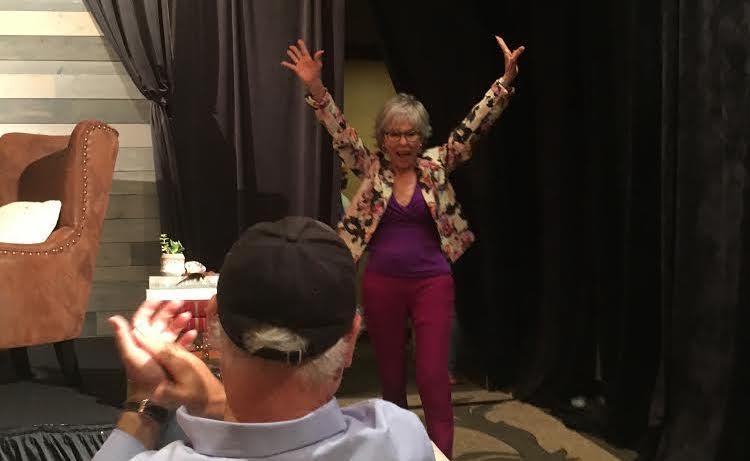
One Day at a Time
The One Day at a Time panel was a standout. I thought it was particularly great to hear how Norman Lear and EP Mike Royce (two white men) have given Gloria Calderon Kellett (a Latina) full agency in the creation of the show.
— Nathan Rossi, PhD in Media Studies
Audience love for this show, for the showrunner, Gloria Calderon, and for the three actresses on the panel—Isabella Gomez, Justina Machado, and the incomparable Rita Moreno—was palpable. From a generational perspective, it was fascinating hearing about each of the panelists’ very different career trajectories and experiences working as a Latinx in Hollywood. Early on in the panel, Calderon stated, “We want this show to make people feel less alone,” a theme that was echoed later during the Q&A when an audience member told the panel, “This show makes me feel normal, Thank you.”
— Kate Cronin, PhD in Media Studies
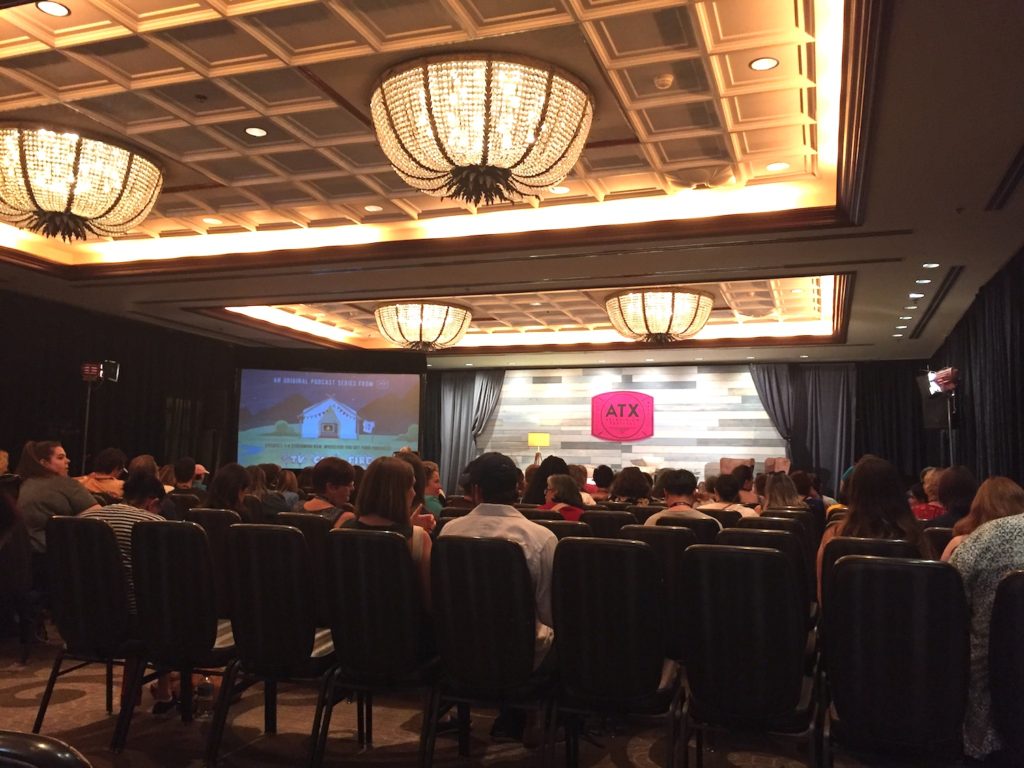
Politically Minded
A great panel on the way Robert and Michelle King (The Good Fight) and David Simon (The Deuce) handle politics and social commentary on their respective shows. The Kings had planned to avoid Trump in the second season of their show before doing a complete 180 and steering into the subject head on, and Simon was forced to scrap several drafts of a Capitol Hill-set pilot due to the surprising election and its ongoing aftermath. Simon concluded that writers are morally obligated to address political subject matter right now.
— Nathan Rossi, PhD in Media Studies
Show Me All Your Flaws
The panel had a disparate group of panelists who all agreed that characters must (and usually do) have flaws, but the topics veered into the flaws of the industry as well, including the lack of women and people of color behind the camera and guest directors not being on the same page as the actors. Though it didn’t stay on topic, it was nonetheless an interesting and extremely candid panel.
— Nathan Rossi, PhD in Media Studies
This panel seemed to be, by co-founder, Emily Gipson’s own admission, a sort of thrown together panel, filling in the gaps of the rest of the fest; however, it took on a life of its own that was really satisfying. It started out as a discussion about the flaws of characters we love and why we love them, but quickly the actors, writers, and directors turned inward, discussing their own personal flaws or their feelings about the flaws of TV production. Like when Liz Tigelaar admitted to locking her own wife out of her house, subsequently writing it into her show or when Scoot McNairy discussed getting into a heated debate with a guest director about whether or not he should be reading a bedtime story angrily to his on-screen child. Classic.
— Raven Patton, MFA in Writing
TGIHulu!
In a festival that has come to highlight more and more premium cable and original streaming content, TGIHulu! was a nostalgic look back at the tail-end of the network era—albeit via streaming platform. It’s not surprising that the programming block’s recent renaissance has been orchestrated by the majority network-owned platform. What is perhaps more surprising is how nostalgia has been mobilized as both a network strategy and an industrial scapegoat. As the Critics Throwdown and Un-Cabled panels both noted, platforms and audiences seek a balance of premium programming and “comfort food” shows. As a result, more classic and retro shows have been revived via licensing agreements and streaming platforms. Hulu, with its linear network ties, has been the most aggressive and successful in the use of this strategy. Licensing nostalgia seems to be working: while they won’t release how much they net annually from subscription fees, Hulu confirmed that they cleared $1 billion in ad sales during 2017. Though the discussions about Hulu’s role in this resurgence were interesting, the majority of the panel’s discourse revolved around mobilizing nostalgia and recounting what it was like to produce TGIF shows. Ben Savage noted that it is much more difficult for child actors today than it was during the 1980s and 90s, reminiscing about the relative privacy he and his co-stars shared. Similarly, William Bickley—creator of Family Matters—lamented how quickly shows are cancelled now, without the chance to develop their characters or their audience. While there was much camaraderie and appreciation on the stage and in the audience, there was a tension underlying the Q&A. When the panel was questioned about the limited number of female showrunners in the 1980s and 90s, the cracks started to appear. Before Nell Scovell could address the prompt, her older male colleagues joked about getting a sex change to be part of the discussion. Similarly, when asked how a largely white creative team could write to the middle class Black experience, they fell back on a well-worn scapegoat: the shows weren’t about race, they were about the universal nostalgia for family and traditional values. The role nostalgia plays in the marketing and rationalization of television is certainly interesting, but the best part was sensing the higher standards that audiences are starting to demand from television creatives in a post-BLM and #MeToo era.
— Lesley Willard, PhD in Media Studies
Un-Cabled: Repackaging TV for a New Generation
In the industry panel on new platforms with panelists from Playstation Vue, Hulu, Roku, and YouTube Red, each speaker attempted to strike a balance between lauding the wide variety of content (and channels) with their own unique offerings. The payoff for these platforms is the promise of increasingly granular viewership data—when/where/how/and in what combinations shows are viewed. But the availability of this data offers merely a promise—that the platform with the best data will be able to most accurately chase, or even predict what tv audiences want in an overwhelmingly crowded market. With this glut of content, the challenge of “Peak TV” (or arguably post-Peak TV) is not a lack of worthy narratives in a vast wasteland, but instead a seemingly-endless expanse of content to sift through.
— Kyle Wrather, PhD in Media Studies
Despite segregating the new media and streaming outlets—YouTube Red, Hulu, Roku, Playstation Vue, Blu Ribbon Content—in one panel, the content and concerns on display here are indicative of the turns both ATX and the broader television landscape have taken: streaming is king. However, even in the panel designed to most directly address this shift, the panelists focused on towing the PR line as well as lightly dragging the “platform-that-shall-not-be-named” (sorry, Netflix). While there was plenty of talk about content development, acquisition, and organization, they skirted the current policy and legal reasons that impact and motivate Internet-distributed television. There were a few interesting nuggets, though. Instead of focusing on courting millennial “cord cutters,” most of the panelists were concerned with older audiences. Jon Wax of YT Red explained that they have to move away from the quirky content that developed YT’s user base to attract older audiences who are amenable to monetizing a previously free platform. The representatives from Playstation Vue and Roku fear the various obstacles in making content accessible and attractive for the aging boomer audience. Lisa Holme, the VP of Content Acquisitions at Hulu, noted that platforms are actively working to balance high-intensity premium content with “comfort food” shows, nodding to the continued importance of licensing amidst the boom of development. Finally, with WB-owned Blu Ribbon producing original content that can only be streamed through their own outlets and Disney potentially developing their own platform, it seems that “Peak TV” may pave the way for “Peak Platforms.”
— Lesley Willard, PhD in Media Studies

Events & Screenings
Brockmire
The Brockmire panel was preceded by a screening of episode 2.7, “Caught in the Rundown.” The panel featured writer-creator Joel Church-Cooper and stars Hank Azaria and Tyrel Jackson Williams. They discussed how the series’ run on IFC has allowed for the showrunners and actors to develop their characters in larger arcs, with a third and fourth (and final) season already in the works.
— Eric Forthun, PhD in Media Studies
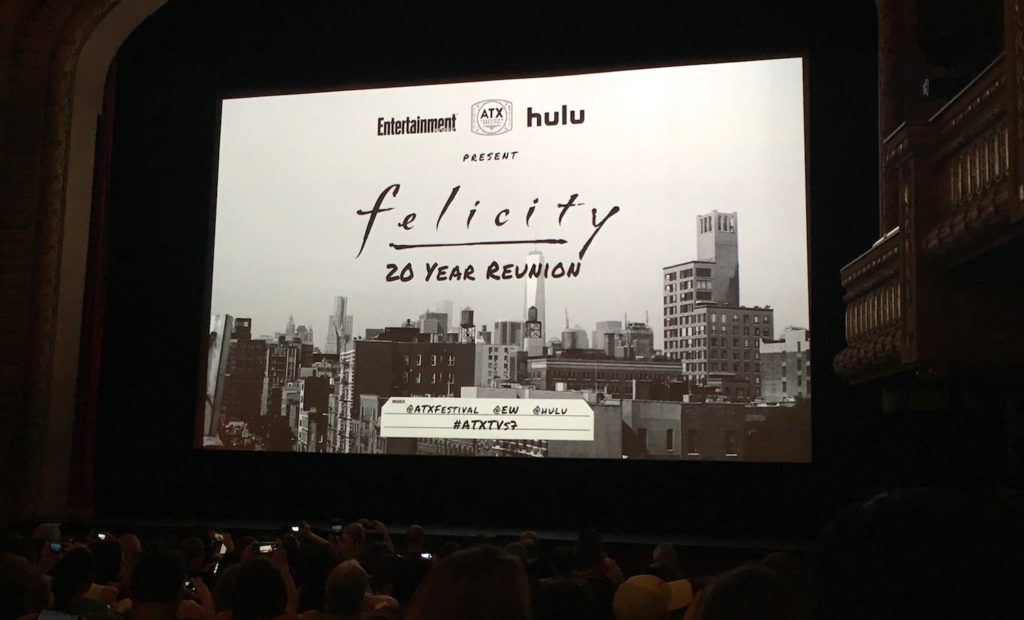
Felicity Reunion
The Felicity 20 Year Reunion was moderated by a super-fan friend of the festival organizers rather than a more seasoned host, which allowed the conversation to take a free-form direction that dove into inside jokes, fun trivia, and behind-the-scenes memories. As a long-time fan myself, I was most elated to see not just that the three main stars reunited (Keri Russell, Scott Speedman, and Scott Foley, who played Felicity, Ben, and Noel), but that a number of the actors who played well-loved characters were in attendance, including Greg Grunberg (who played Sean), Amanda Foreman (Meghan), Tangi Miller (Elena), Amy Johnson (Julie), Ian Gomez (Javier), and Rob Benedict (Richard), as well as director Lawrence Trilling. Nods to fans came up frequently through talk of the show’s little eccentricities and plot devices like Sean’s ‘smoothaise’ and ‘docuventary’ (which we found out was not actually shot by Grunberg because of union rules), and the mysterious contents of Meghan’s box (Foreman gave her theories, which ranged from a human finger to a murder confession). Big laughs came when Scott Foley and Keri Russell forgot that their characters had slept together on the loft’s roof in season 4 (a major plot point for the final season), but luckily actors Foreman, Grunberg and Benedict had clearer recollections and could fill in their cast mates on the twists and turns of the show. Perhaps the most exciting moment for fans was when Foley recanted earlier statements that a reunion show would betray the original’s show’s intent and cultural moment. Visibly moved by the affection showcased amongst the cast and crew onstage after many years, Foley changed his mind on stage and left open the door for an all-grown-up Felicity reboot.
— Lucia Palmer, PhD in Media Studies
The last day of the festival was headlined by the Felicity 20-Year Reunion, which ended up being an ideal blend of nostalgia and acknowledgement of how far the cast has come since the show first aired in 1998. The festival co-founders, Caitlin McFarland and Emily Gipson, introduced the panel, saying that bringing the cast of Felicity together for their event was something they could only dream of doing when they established the festival in 2012.
Throughout the much-anticipated hour-and-a-half-long panel, the crowd was buzzing with laughter and excitement about seeing the entire cast of series regulars together for the first time since the WB show ended in 2002. Moderated by actor/comedian/Felicity enthusiast Lennon Parham, the panel ranged in subject matter from casting decisions (Keri Russell, who played the titular character, was incredibly nervous, to the point where the show’s creators, J.J. Abrams and Matt Reeves, pulled her aside and into a copy room and told her jokes until she was ready to go back into her audition) to the final episodes, about which several cast members struggled to remember details.The panelists pieced together how the controversial final episodes came to be: the network effectively canceled Felicity in 2002 to make room for a mid-season replacement, which performed so badly when it aired that the network asked the showrunners to create five more episodes to fill the rest of the time slots for the season.
Amanda Foreman, who played Felicity’s mysterious and abrasive but charming roommate Megan, remembered the finale’s chronology notably well, reminding Scott Foley (who played Noel Crane, one of the two romantic prospects for Felicity before moving on to Scandal and his latest show, ABC’s Whiskey Cavalier) that he died in the alternative timeline created for the final five episodes. Neither Foley nor Russell were fully convinced of the details of the final five episodes, which eventually resulted in Foreman asking the audience to verify details. Foreman acknowledged that some fans disliked the final five episodes, but explained that she loved it because it was a creative way to deal with the network’s last minute decision to undo the series’ cancellation and go somewhere new with the storyline despite the fact that the show had already come to a natural conclusion.
— Lauren Wilks, MA in Media Studies
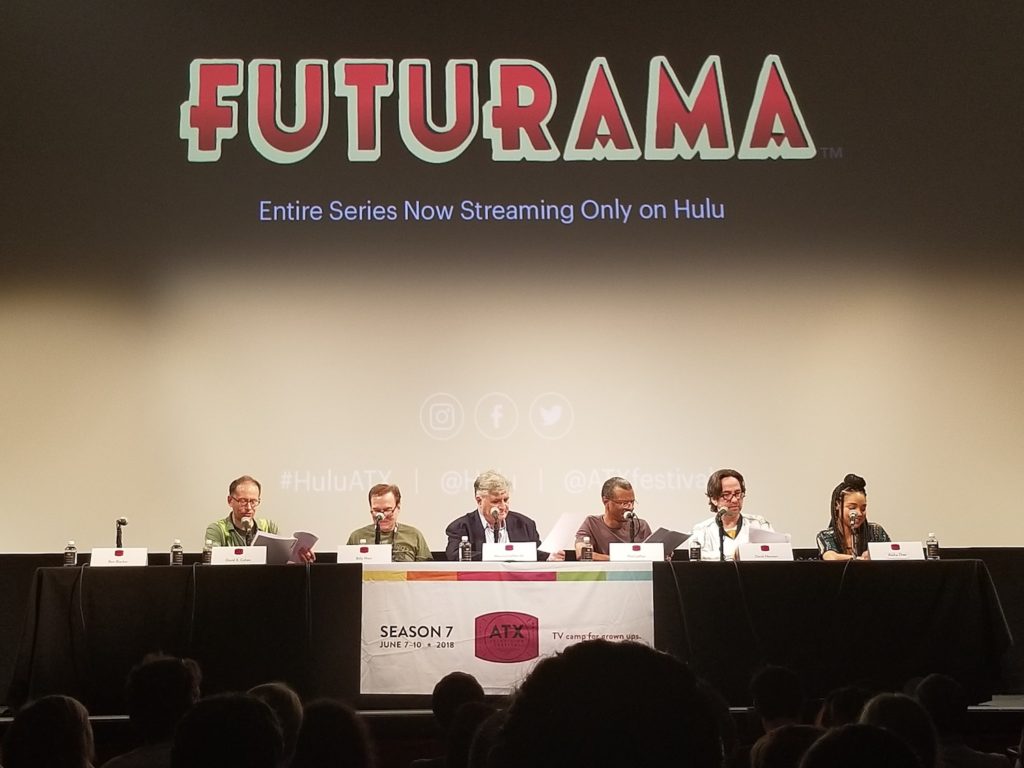
Futurama: Table Read
The majority of the Futurama cast reunited to present a live table-read of one of the show’s fan-favorite episodes, “The Six Million Dollar Mon”. The table-read integrated the original animated beginning and ending of the episode with a table-read that included LaMarr, Billy West, Maurice LaMarche, and David Herman. Aisha Dee (star of Freeform’s The Bold Type) sat in to cover the female voices. The hilarious antics of the cast were in overdrive, as the cast seemed to enjoy themselves and feed off of the energy in the Paramount Theatre. Not to replicate the episode word-for-word, cast members eagerly directed friendly jabs at John DiMaggio (voice of Bender Rodriguez), who was notably absent, as well as Donald Trump’s personal lawyer, Michael Cohen.
The Q&A discussion that followed the table-read was lively and mostly focused on the culture of voice acting as well as the potential for Futurama‘s continuation (especially as the show’s cast recently voiced an original podcast episode in 2017). While signs show that Futurama may never return to television with all-new episodes (or movies), the panel demonstrated the strong affinity fans have for the show, even years beyond the show’s finale.
— Rusty Hatchell, PhD in Media Studies
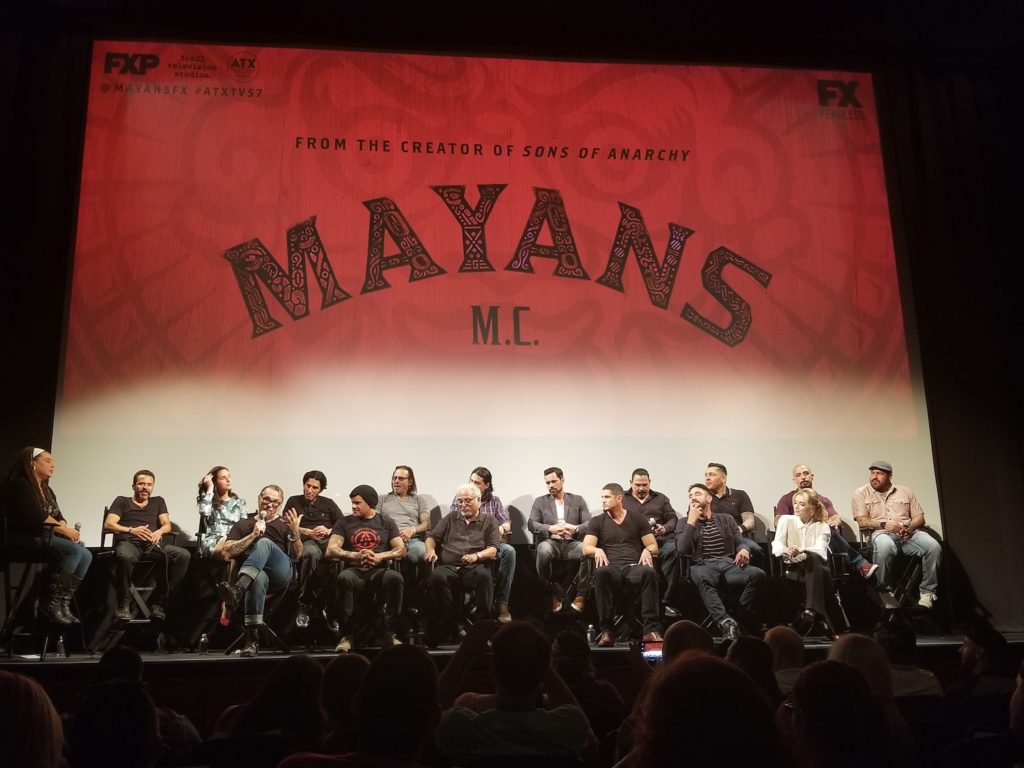
Mayans M.C.
Years after the closure of FX’s Sons of Anarchy, the highly-anticipated Mayans M.C. is primed to pick up the show’s energy in a different part of California with a new set of characters and stories. The Paramount Theatre hosted a world-premiere sneak peek of the show’s first episode as ATX TV Festival invited fans, critics, and participants of the annual ATX Republic of Texas Biker Rally (one of the largest motorcycle rallies in the country) to celebrate the return of showrunner Kurt Sutter to cable television.
After the short sneak peek (which was shown without color correction or sound adjustments), co-creators Kurt Sutter and Elgin James, executive producer Norberto Barba, and nearly 15 cast members all joined the stage for a lively discussion about the show’s development and production. As the Sons spin-off focuses on the Mayans, a Latino motorcycle gang in southern California, and their cross-border interactions with the fictional Galindo cartel, the mostly-Latino cast and crew invigorated discussions about race and representation in today’s television climate. Issues focusing on brotherhood, masculinity (the cast is overwhelming Latino male), gender, and racial politics all came into play as Sutter, James, and the cast discussed how the spin-off sets itself apart from Sons.
— Rusty Hatchell, PhD in Media Studies
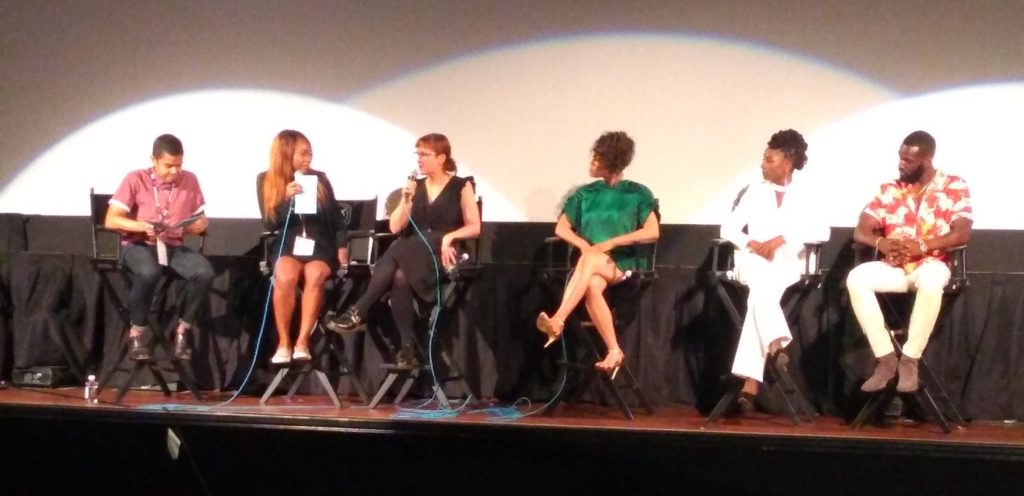
Queen Sugar
The screening of an upcoming episode of Queen Sugar—the popular melodrama produced by Ava DuVernay and Oprah now airing in its third season on the OWN network and well known for its use of an all-female director team—was quite moving; the show always pulls at your heartstrings (and tear ducts) but the Black actors who play the three Bordelon siblings were also particularly eloquent and open in their discussions about how their characters have changed and inspired them and what playing them has meant to them both personally and in terms of the community and audiences engaging in it. It was also rewarding to see Austin’s own Kat Candler discussing the show at the Alamo Ritz. Candler talked about how hard it was for her to break into the TV business from the world of (independent) film, all the doors that were closed to her, and how Ava DuVernay’s decision to hire women from non-TV backgrounds was “life-changing” in opening those doors; she began directing single episodes in Season 1 and now serves as the showrunner for season 3, which just announced its complete lineup of all-female directors, bringing the series total to 25.
— Jackie Pinkowitz, PhD in Media Studies
Sharp Objects
The pilot was pretty much what I expected from the caliber of talent involved, which isn’t a bad thing. I suppose the unsung standout for me was Sophia Lillis as Young Camille. The panel was fascinating, because it didn’t really focus on the stars (Amy Adams was there), but rather focused on how the show made it from idea (in this case Gillian Flynn’s novel) to HBO. It was interesting to hear how EP Jason Blum originally envisioned the book as a film, before meetings with showrunner Marti Noxon led to it becoming a mini-series. Amy Adams, who also executive produced the series, mentioned that she signed on right away because “Television is in such a renaissance right now.” While that is debatable, it is interesting to see how this show and also the actresses from Big Little Lies, are really pushing HBO as as a standout for telling women’s stories.
— Nathan Rossi, PhD in Media Studies
The screening was great. It was highly anticipated and delivered on it all. I really enjoyed Marti Noxon’s take on how women of different generations deal with self-harm as well as issues of depression and anxiety.
— Raven Patton, MFA in Writing
It’s extremely obvious to say that the show is a cross between Big Little Lies and Gone Girl but that is exactly what it looks and feels like. Upper-class woman struggles very discretely with trauma in unsuspecting town. Her inner darkness plays out with high melodrama and deep insensitivity. I found it hard to not to cringe at the final shot where Amy Adams disrobes and takes a bath, revealing the hundreds of self-made cuts across every inch of her flesh. While it’s relatively new to see a character who uses self-harm tactics on television, this rather languorous scene brought me discomfort. Is high melodrama still all fine even when it starts to feel like it fetishizes female pain?
The panel was very interesting and there was some refreshing banter across the stage. However, the person behind series, Marti Noxon, probably spoke the least. Would be interesting to see how her start in Buffy and Mad Men finally brought her to her own show.
— Kate Shannon, MA in Media Studies
The Americans
Hilarious and insightful retrospective panel. The actors and producers were evasive about answering too many questions, choosing instead to leave the interpretations up to the audience. Noah Emmerich stated that he was no more qualified than anyone watching to pin down a singular interpretation to a character’s action.
— Nathan Rossi, PhD in Media Studies
This panel was my most anticipated of the fest. I was so happy to see the writers and actors of this high stakes, high tension show let their hair down so to speak and be so candid and jovial.
— Raven Patton, MFA in Writing
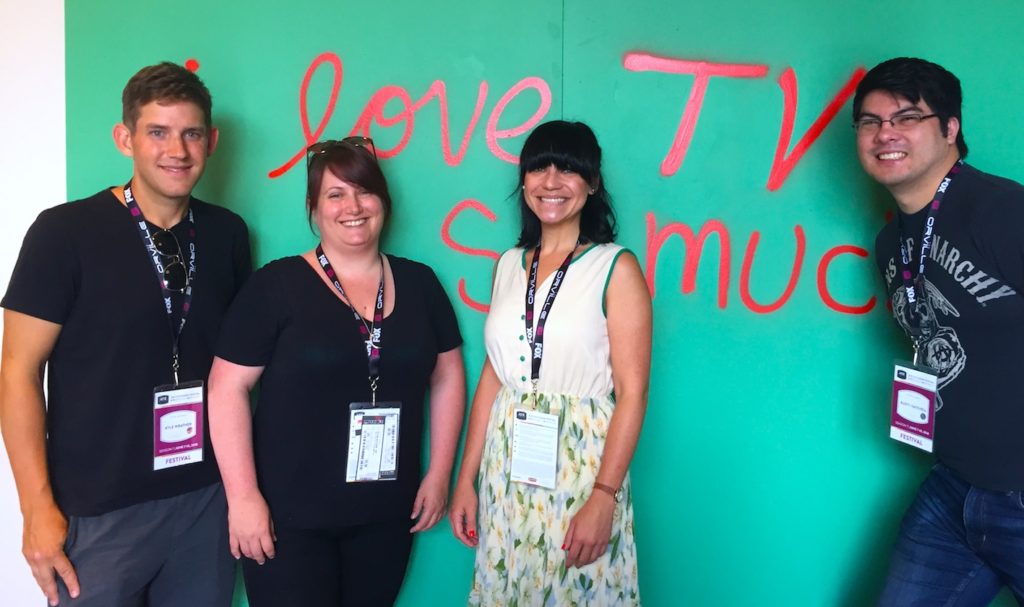
Thank you to the ATX Television Festival for providing us with a means to attend the festival and to the UT Austin RTF grad students who shared their time, notes, and thoughts (Rusty Hatchell, Kate Shannon, Jackie Pinkowitz, Eric Forthun, Raven Patton, Nathan Rossi, Lucia Palmer, Jackie Johnson, Lauren Wilks, and Kyle Wrather).
If you have any questions, comments, or thoughts about ATX 2018 or our coverage of the festival, feel free to leave a comment below.
Image Credits:
1. Photo courtesy of Lesley Willard.
2. Photo courtesy of Lesley Willard.
3. Photo courtesy of Lesley Willard.
4. Photo courtesy of Jackie Johnson.
5. Photo courtesy of Lesley Willard.
6. Photo courtesy of Lesley Willard.
7. Photo courtesy of Lucia Palmer.
8. Photo courtesy of Rusty Hatchell.
9. Photo courtesy of Rusty Hatchell.
10. Photo courtesy of Jackie Pinkowitz.
11. Photo courtesy of Lesley Willard.